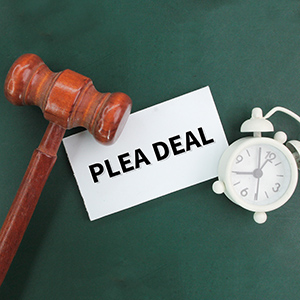
In this article, you can discover…
- What plea deals are, and how they work in Georgia.
- The benefits and possible drawbacks of accepting a plea deal.
- How an experienced attorney can help you decide between a plea deal and a trial.
What Is A Plea Deal, And How Does It Typically Work In Georgia?
A plea deal happens when the State gives you the opportunity to plead guilty to certain charges and accept certain punishments in order to prevent your case from going to trial.
The prosecutors will review your case file and the evidence against you. They’ll also share this evidence with your attorney. Both sides review this information and discuss whether the State has strong or scant evidence against you. Often, if the evidence against you is scant or weak, prosecutors may offer you a better deal than they would if the evidence against you were overwhelming.
In the same way, your attorney will consider issues such as an officer’s use of excessive force and other legal challenges that prosecutors might run into as they seek to convict you. Your attorney can use these factors to negotiate for lesser charges and less severe punishments.
What Factors Are Considered When A Plea Deal Is Made?
The primary factor that prosecutors will consider is the evidence against you. For example, a case with clear audio and video evidence showing you committing a crime may not lead to a favorable plea deal. However, a case with limited or circumstantial evidence could allow much more favorable terms to be offered.
The background and circumstances of your case and the skill and reputation of your attorney can also play a meaningful role in the types of plea deals you are offered.
What Are The Potential Advantages Of Making A Plea Deal?
Accepting a plea deal can give you some control in a situation that often feels overwhelming. Trials are unpredictable—if you go to court and lose, you could end up with a much harsher sentence than what the prosecutor was willing to offer. And trials don’t move quickly. It could take months, even years, before your case is resolved, and during that time, you might be stuck in jail without bond.
A plea deal gives you a clear outcome. Instead of waiting and wondering what might happen, you will know exactly where you stand and what is ahead. That certainty can be the first step toward putting this chapter behind you and starting to rebuild your life.
What Are The Potential Disadvantages (If Any) Of Making A Plea Deal?
You may feel pressured into accepting a plea deal simply to be freed from jail. But if you know you are innocent of the charges that you face, it can be worthwhile to allow your attorney to argue for your innocence in court. Whether or not it is best to go to trial is a decision that you and your attorney must make together.
How Will I Know If I Should Take A Plea Deal Or Fight My Case In Court?
Your attorney will help you decide if it’s better to accept a plea deal or take your case to trial. They’ll review the evidence against you and give you a realistic sense of a likely outcome. If there is a strong amount of evidence against you, accepting a plea deal may be safer than risking severe penalties being handed down by a judge.
Every case is different, however. Your lawyer will review with you the pros and cons of accepting a plea deal or going to court, and the ultimate decision will be yours. If you decide to head to trial against your attorney’s advice, they’ll help you prepare for trial and the legal process ahead.
How I Balance Legal Strategy With Emotional Concerns When Discussing Plea Deals
I always strive to be compassionate. Discussing plea deal options can be emotional, and I’ll help you see the bigger picture of your case and how a plea deal may be a better option. A plea deal won’t mean the end of your life, and can allow you to move on from your criminal charges much faster than a trial.
Facing the legal system can feel overwhelming. I’m here to help you think rationally and guide you toward the best possible option for yourself, your family, and your future.
Still Have Questions? Ready To Get Started?
For more information on the plea bargaining process in Georgia, an initial consultation is your next best step. Get the information and legal answers you are seeking by calling (404) 247-2030 today.
